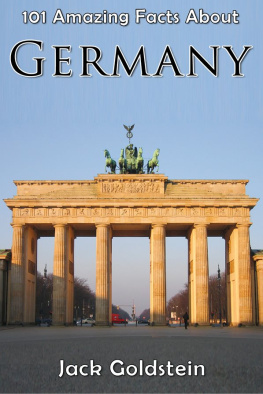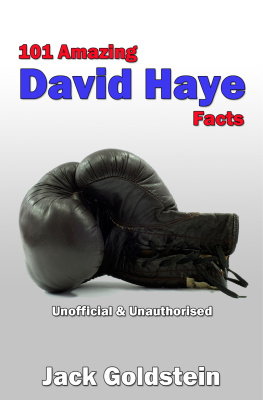Title Page
101 AMAZING FACTS ABOUT GERMANY
Jack Goldstein
Publisher Information
Published in 2013 by
Andrews UK Limited
www.andrewsuk.com
The right of Jack Goldstein to be identified as the Author of this Work has been asserted by him in accordance with the Copyright, Designs and Patents Act 1998
Copyright 2013 Jack Goldstein
All rights reserved. No part of this publication may be reproduced, stored in a retrieval system, or transmitted, in any form or by any means without the prior written permission of the publisher, nor be otherwise circulated in any form of binding or cover other than that in which it is published and without a similar condition being imposed on the subsequent purchaser. Any person who does so may be liable to criminal prosecution and civil claims for damages.
Disclaimer: All facts presented in this title were gained from common and reputable sources in print and on the internet. If any detail within this title is found to be incorrect, the author will be happy to publish a corrected version.
Introduction
In this amazing eBook you can find more than one hundred facts about the country of Germany. Separated into sections such as its geography, its people, famous German figures from history and many more you will find some fascinating information inside!
Whether you are planning on visiting Germany, working on a geography project or just want to know more about this beautiful country, this is an excellent addition to your bookshelf. Find the information you need, fast!
Follow Jack Goldstein on Twitter @GoldsteinBooks
Visit Goldstein Books at www.jackgoldsteinbooks.com
Key Facts
- Germany has the highest population of any country in Europe.
- Its geographical territory covers more than 137,000 square miles.
- It borders Denmark, Poland, the Czech Republic, Austria, Switzerland, France, Luxembourg, Belgium and The Netherlands.
- The Germans boast the fourth largest economy in the world.
- The capital of Germany is Berlin.
- Germany - as we know it today - was formed in 843 after splitting from King Charlemagnes Carolingian Empire.
- The country has a population of more than 81 million.
- The currency used in Germany is the Euro.
- It has a GDP of around 2.6 trillion Euros - at the time of writing that is around 3.4 trillion US Dollars.
- After World War 2, Germany was split into two states - East Germany and West Germany - however the country was reunified in 1990.
Famous German Figures
- Albert Einstein (1879-1955) - one of the worlds greatest ever scientists.
- Karl Marx (1818-1883) - father of communism
- Ludwig van Beethoven (1770-1827) - renowned classical composer.
- Adolf Hitler (1889-1945) - leader of the Nazi party
- Otto von Bismarck (1815-1898) - unified the German states into the powerful German Empire
- Johannes Gutenberg (1400-1468) - invented movable type
- Wolfgang Amadeus Mozart (1756-1791) - prolific and great composer
- Johann Sebastian Bach (1685-1750) - greatest composer of the baroque era
- Karl Benz (1844-1929) - inventor of the petrol-powered car
- Michael Schumacher (1969-) one of the greatest racing drivers of all time
Geography
- Germany, along with its bordering countries, is home to one of Europes key mountain ranges - the Alps.
- The Zugspitze is the tallest mountain in Germany, reaching 2962 metres.
- The most famous rivers in Germany are the Rhine, the Danube, The Elbe and the Kiel.
- Due to its size, the weather differs considerably across the country; however the winters are generally mild and summer highs often exceed 85 degrees Fahrenheit.
- An amazing 30% of the country is covered by forest and woodland.
- In addition to 14 national parks, the country boasts over 400 zoos and animal parks - more than any other country in the world.
- Germans have been concerned about their environment long before the rest of the world caught up - the country was home to the worlds first green political party, in 1979.
- In fact, the world ecology was made in 1866 by German biologist Ernst Haeckel.
- Still on an environmental theme, Germany has one of the highest recycling rates in the world.
- In its native language, the country is called Deutschland.
General Facts
- Around two thirds of Germanys highway network - the autobahn - has no speed limit at all.
- German is the third most commonly taught language in the world.
- The city of Ulm is host to the worlds tallest cathedral.
- Berlin is an amazing nine times bigger than Paris.
- Germany has been home to some of the worlds greatest philosophers, including Kant, Hegel, Nietzsche and Heidegger.
- More than 10% of the worlds exported goods come from Germany.
- The country has produced a fair number of inventors. Famous German inventions include the pocket watch, the light bulb, the petrol engine and the clarinet!
- Despite having plentiful natural resources of Uranium, Germany decided to phase out nuclear powerplants.
- Germany was one of the founder members of the European Union, in 1952.
- German people are the second biggest consumers of beer in the world!
Berlin
- The city is built around the river Spree.
- It is one of the cultural centres of Germany, with renowned universities, orchestras, museums and wonderful architecture.
- The population of the city is around 3.5 million.
- The two main airports that serve Berlin are called Berlin Tegel and Schonefeld.
- Although the origin of the name Berlin is uncertain, many Germans believe it comes from the German word for bear, whereas others think it might be from an old Slavic word for swamp.
- John F Kennedy once made a famous speech, saying Ich bin ein Berliner (I am a Berliner) to show the United Nations support for what was at the time West Germany. Some people have wrongly suggested that because he didnt omit the word ein in his quote, he actually said I am a jelly doughnut.
- It is believed that Berlin dates back to the late 12 th century; the earliest evidence of settlements are wooden parts of a house from around 1170-1190 found during an archaeological dig.
- Berlin is home to two zoos. The older, Zoologischer Garten Berlin, can boast the most diverse range of species in the world.
- The city boasts an amazing 979 bridges and 3314 miles of roads!
- Berlin hosted the Olympics in 1936 and also the FIFA World Cup Final seventy years later.
Places to Visit
- Oktoberfest - an annual beer festival held in Munich.
- Cologne Cathedral - The greatest Gothic cathedral in Germany.
- Holstentor - the city gate of Lubeck.
- Heidelberg - a beautiful baroque city which escaped the bombing of WWII.
- The Brandenburg Gate - Berlins only surviving city gate.
- Neuschwanstein - a Bavarian fairy-tale castle.
- The Dresden Frauenkirche - a beautiful church, rebuilt 50 years after being destroyed in the second world war.
- The Black Forest - some of the most beautiful landscapes in the world.
- Trier - Germanys oldest city, known as The Second Rome.
- Sanssouci - Frederick the Greats summer palace.
The World Wars
- Like most European countries, Germany has fought many wars to become the country it is today.
- In 1914, the assassination of Austrias crown prince - Franz Ferdinand - led to war in Europe. Germany sided with the Austro-Hungarian and Ottoman empires.
- The conflict was one of the bloodiest and most terrible in history. At the time it was known as the Great War, however we now refer to it as the First World War.
- Two million German soldiers died between 1914 and 1918. In the end, Wilhelm, the Emperor of Germany abdicated, changed the country to a republic and surrendered.
Next page





